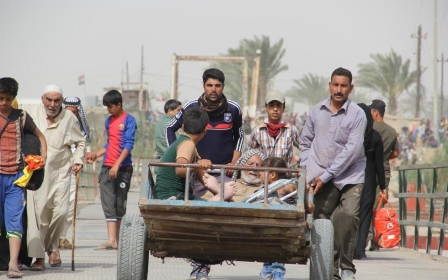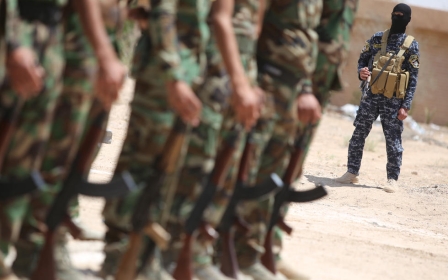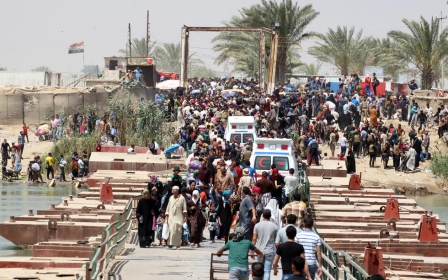Anti-IS coalition meet in Paris one year on since Mosul fall

US-led coalition members carrying out air raids against the Islamic State (IS) group met in Paris on Tuesday to focus on the year-long crisis in Iraq that began when militants overran the city of Mosul last June.
The meeting was attended by ministers from 20 countries in the coalition, including Saudi Arabia and Turkey.
US officials pledged to continue the war for as long as necessary, hailing a campaign that they said has seen IS-held territory shrink by 25 percent over the last year. The comments came just hours after IS launched fresh offensives in southern Syria, MEE’s contributors on the ground said.
"This will be a long campaign," said Antony Blinken, deputy US Secretary of State, who was standing in for John Kerry after the Secretary of State broke his leg in a cycling accident last week.
"We will succeed if we remain united, determined and focused."
Iraqi Prime Minister Haider al-Abadi attended the coalition meeting amid plans by Baghdad to recapture Ramadi, which dominated the meeting, according to a senior US official.
During the meeting, Abadi criticised the international community's response to IS's lightning advance across large swathes of Iraq, saying Baghdad had had to "depend on itself".
Though 20 countries pledged support, Abadi said, "action on the ground has been limited".
During a press conference held during the summit, Abadi outlined how his government intends to retake Ramadi, and what coalition partners can do to help.
He said that the majority of IS fighters were foreign, adding that the militant group's advance is a "failure" of the whole world.
"What I can see for Iraq, the flow of foreign fighters is more than before," he told reporters, hours before the meeting in the French capital.
"There is an international problem, it has to be solved."
He said that up until recently, around six out of 10 fighters were Iraqi and the remainder foreign, whereas now the proportion was reversed.
'Needs all the support of the world'
"Daesh is creating a new generation of fighters, dedicated, ideologised. They are prepared to die but they are not suicide bombers," said the prime minister, using an alternative name for the IS militants.
Abadi said Iraq "needs all the support of the world" to counter the IS advance, but "we are not getting much. I think this is a failure on the part of the world... There is a lot of talk of support for Iraq, there is very little on the ground."
Abadi also urged the international community to help Iraq purchase weapons to fight the militants, saying the country had received "almost none. We are relying on ourselves."
"Because of our fiscal problems, we were not able to get into new contracts for arms supply. Most contracts were done in the previous government with the Russians," he said.
"The Russians are under sanctions now by the US, so we are finding it very difficult to pay for these arms to get them. The money is there sitting in the bank, but we cannot get them."
Abadi said sanctions also ruled out buying arms from neighbouring Iran.
"We are not asking for arms, but please let us purchase arms easily."
British Foreign Secretary Philip Hammond, on the eve of the meeting, refused to classify the fight against IS as a failure.
"I have no doubt that this will be a generational struggle," Hammond said, giving a time span of around five years.
"This will take a long, long, long time to challenge and overcome the underlying ideology that supports" the group, he said.
Most analysts, however, have questioned the efficacy of a purely aerial campaign and argue that while coalition strikes have helped Iraqi forces regain ground from IS, the fall of Ramadi has acted as a stark illustration of the limits of air power in the absence of effective forces on the ground.
Civilian deaths
Violence has continued to rage even in areas not under strict IS control. On Monday, a suicide bomber blew up his explosives-laden vehicle at a police base in Iraq's Salaheddin province, killing at least 37 people and wounding more than 30, officers said.
The blast further slowed an operation to retake the city of Ramadi, they added.
"They are mostly policemen," said a doctor at the main hospital in the nearby city of Samarra where the casualties were taken.
Some police officers said the suicide attacker used a tank to force his way into the police base, located between Samarra and Tharthar lake, northwest of Baghdad.
The area is being used as part of a military operation aimed at cutting off the IS group's supply lines in Anbar province of western Iraq.
IS fighters have in the past year seized a formidable arsenal of military vehicles, weapons and ammunition from retreating Iraqi forces.
The militants' latest haul of gear came on 17 May when Iraqi forces fled and they captured Ramadi, the capital of the restive Anbar.
The health department in Anbar alone reported at least 102 civilian deaths in May, while the United Nations said even partial figures not covering the areas worst affected by the conflict showed at least 665 civilians were killed last month.
Aid agencies are preparing to launch a fundraising appeal for $500m for the crisis in Iraq, the UN children's agency UNICEF said.
According to the UN, 2.9 million people have been displaced by violence in Iraq since the start of 2014. Meanwhile, more than 7.6 million have been internally displaced in Syria, while a further 4 million have become refugees.
New MEE newsletter: Jerusalem Dispatch
Sign up to get the latest insights and analysis on Israel-Palestine, alongside Turkey Unpacked and other MEE newsletters
Middle East Eye delivers independent and unrivalled coverage and analysis of the Middle East, North Africa and beyond. To learn more about republishing this content and the associated fees, please fill out this form. More about MEE can be found here.





